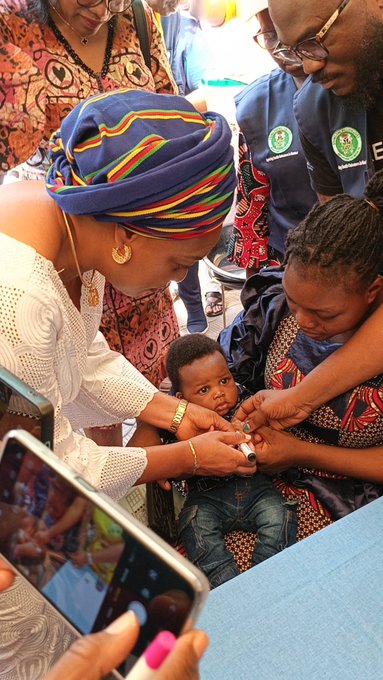Health
Ophthalmological Society Of Nigeria Holds AGM In Edo, Promises Sustainable Eye Health System

Members of the Ophthalmological Society of Nigeria, OSN, on Thursday expressed commitment to promoting sustainable eye health systems targeted at preventing avoidable blindness through quality and affordable eye health services in Nigeria.
Chairman, National Eye Health Committee, Prof Afekhide Ernest Omoti, while speaking in Benin city, the Edo state capital, during the opening ceremony of the 46th Annual General meeting and Scientific conference of the Ophthalmological Society of Nigeria (OSN) advocated for a patient centered inclusive eye health services championed by professionals.
The 46th Annual General meeting of the society was themed: ‘Building sustainable eye health systems.’
Omoti, who is a consultant ophthalmologist at the University of Benin Teaching Hospital (UBTH), said that the demand became imperative from the members of the noble profession on the need for patient centered inclusive eye health services to ensure access to good quality eye care.
“This is the commitment that is being demanded from the members of this noble profession today. It is my wish that after this meeting, there will be a patient centered inclusive eye health services championed by the caliber of persons seated in this room ensuring access to good quality eye care.”
He said the theme for the AGM, building sustainable eye health systems and ‘equity in eye health’ as subtheme became apt for the moment as deliberations and the communiqué gotten from the meeting will help strengthen and support the existing eye health systems framework already being put in place by the government and also ensure that there is no barrier in accessing eye care services within the nooks and crannies of the country.
“The government of the Federal Republic of Nigeria through the Federal Ministry of Health ably led by Dr. Osagie Ehanire has made equity in eye care services a key component of its agenda in ensuring that we have a country where no one is needlessly blind.
READ ALSO: ASUU Strike: UNIBEN Reacts To Alleged Resumption
” The ministry through the National Health Programme (NEHP) domiciled in the department of public health on its part is not resting on its mandate as it tries to champion the formulation and implementation of various people centered policies and programmes, one of which is the maiden national eye health policy that has equity as one of its policy thrust,” Omoti said.

Earlier, President of Ophthalmological Society of Nigeria (OSN), Dr. Abiola Oyeleye assured that the conference will translate knowledge gained into action to improve patient care.
“This promises to be an interesting conference coming shortly after the launch of our National eye health policy, giving us a good opportunity to understand and be in the forefront of implementing the necessary changes in the eye care industry.
” I implore you all to enjoy the trappings the fantastic team from Edo state OSN has laid out for us and that we return to our homes safely and with happy memories of EDO 2022.”
Health
LASG FLags Off Polio Outbreak Response Campaign

The Lagos State Government, through the Lagos State Primary Health Care Board, has launched the 2025 Polio Outbreak Response Campaign, reaffirming its commitment to eradicating polio and safeguarding the health of its children.
The ceremony, held at the Simpson Primary Healthcare Centre, was led by the First Lady of Lagos State, Dr. (Mrs.) Claudiana Ibijoke Sanwo-Olu, represented by Mrs. Widad Jumoke Mustafa, a member of the Committee of Wives of Lagos State Officials (COWLSO).
In her address, the First Lady emphasised the state government’s proactive measures to keep Lagos polio-free, highlighting the critical importance of the campaign in preventing the debilitating effects of poliomyelitis, which can result in paralysis or death.
READ ALSO: IMPEACHMENT: Lagos Ex-Speaker, Obasa’s ‘Sins’ Revealed
The First Lady also called on parents, community leaders, and stakeholders to support the campaign by ensuring eligible children are vaccinated.
Targeting children aged 0-59 months, vaccination teams will administer the Oral Polio Vaccine (OPV) to prevent virus transmission.
Dr. Kemi Ogunyemi, the Special Adviser on Health, expressed gratitude to Lagosians for their continued cooperation in the fight against polio. While appreciating all healthcare workers and partners for their services, Mrs. Ogunyemi encouraged parents to present their children and wards for the exercise.
Also speaking, the Chairman of Lagos Mainland Local Government, Mrs. Omolola Rashidat Essien opined that Immunization is key in ensuring that children are kept safe from polio and other vaccine preventable diseases.
Dr. Abimbola Bowale, the Supervising Permanent Secretary, Lagos State Primary Health Care Board, who also spoke at the event, underscored the life-saving importance of immunization.
“All children aged 0-59 months need multiple doses of the polio vaccine to ensure full protection. Any child missed represents a potential risk for the poliovirus to spread. The vaccine is safe, effective, and crucial in keeping our communities polio-free,” he stated.
Dr. Bowale also outlined several strategies to ensure the success of the campaign, including fixed post teams stationed at primary healthcare centres and public health facilities, house-to-house visits, and a transit strategy to reach special locations such as places of worship, schools, motor parks, and other public venues.
The event concluded with Dr. (Mrs.) Claudiana Ibijoke Sanwo-Olu officially launched the campaign, marking a renewed effort to maintain Lagos State’s polio-free status.
Headline
Lagos Cholera Cases Rise To 421

The Lagos state suspected cholera cases have risen to 421.
The Commissioner for Health, Akin Abayomi disclosed this on his Instagram handle @profakinabayomi on Saturday.
“As of June 20, 2024, an additional four suspected cholera cases have been reported, as illustrated in the accompanying graph,” he wrote.
He noted that the Emergency Operations Centre in collaboration with all relevant partners is actively engaged in contact tracing, community-based surveillance, awareness campaigns, sample testing, and ensuring that confirmed cholera cases receive appropriate medical treatment.
READ ALSO: Two Suspects Arrested For Stealing Car From Mosque During Juma’at Prayer
On Friday, the commissioner confirmed 35 cases out of the 417 suspected cases and 24 deaths across 20 Local Government Areas in the state.
The cases were reported from Agege, Badagry, Ikeja, Mushin, Ajeromi-Ifelofun, Epe, Ikorodu, Ojo, Alimosho, and Eti-Osa.
Others were Kosofe, Oshodi-Isolo, Amuwo-Odofin, Ibeju-Lekki, Lagos Island, Shomolu, Apapa, Ifako-Ijaiye, Lagos mainland, and Surulere.
Cholera is a food and water-borne disease caused by ingesting the bacteria— Vibrio cholerae — in contaminated water and food. Cholera can cause severe acute watery diarrhoea, and the severe forms of the disease can kill within hours if left untreated.
In Nigeria, cholera is an endemic and seasonal disease, occurring annually mostly during the rainy season and more frequently in areas with poor sanitation.
READ ALSO: Police Arrest 28yr Old Suspected Cultists, Recover Gun In Delta Community
The World Health Organisation on Thursday announced a spike in cholera in several regions of the world, with almost 195,000 cases and over 1,900 deaths reported in 24 countries since the start of 2024.
WHO said the Eastern Mediterranean Region reported the highest number of cases, followed by the African Region, the Region of the Americas, the Southeast Asia Region, and the European Region.
The global health body, however, noted that there are no reported cases in the Western Region, according to its bulletin released on Wednesday.
It said it exhausted its global stockpile of Oral Cholera Vaccines by March but was able to exceed “the emergency target of five million doses in early June for the first time in 2024.”
Health
AUTISM: What You Need To Know

By Silver Yeibake
Autism, commonly known as Autism Spectrum Disorder (ASD), is a neurodevelopmental disorder that affects communication, social interaction, and behavior. Autism is referred to as a spectrum condition since it can manifest in a variety of symptoms and abilities. While the actual cause of autism is unknown, evidence suggests that genetic and environmental factors interact to influence its development.
The risk factors include a sibling with autism, advanced age of parents, exposure to certain air pollutants and pesticides before birth, extreme prematurity, mothers with diabetes, immune system disorders or obesity, any difficulty with delivery leading to deprivation of oxygen to the baby’s brain, fever during pregnancy, lack of certain vitamins minerals during pregnancy, and certain genetic conditions, such as Down, fragile X, and Rett syndromes.
“Risk factors can not on their own cause a disease. However, they can increase the likelihood of that disease in a person.”
It is important to know that contrary to trending claims online, there is no scientific or medical evidence that vaccines or consumption of sugar are risk factors for autism.
READ ALSO: Kidney Stones: What You Need To Know
Autism is defined by difficulties in social interaction and communication. Individuals with autism may struggle to grasp social cues, maintain eye contact, and engage in typical back-and-forth conversations. Some people may also engage in meaningless, repetitive actions, such as hand-flapping or rocking, and have strong interests in specific areas.
It is essential to remember that autism is a lifelong diagnosis, but with early intervention and adequate care, people with autism can live fulfilling lives.
Autism treatment frequently includes behavioral therapy, speech therapy, occupational therapy, and social skills training. Each individual with autism is unique, thus interventions should be tailored to meet their personal needs and strengths.
In spite of the difficulties that autism can cause, many people with autism possess unique talents and abilities. Some people may succeed in fields such as music, art, mathematics, or programming, thus it is important for society to acknowledge and honor the qualities and achievements of people with autism.
In summary, autism is a complicated and diverse disorder that affects individuals in various ways. By raising autism knowledge, understanding, and acceptance, we can build a more inclusive society in which people with autism can thrive and attain their full potential.
Dr. Yeibake, Weriwoyingipre Silver.
Senior Registrar,
Faculty Of Pediatrics,
WACP

 News5 days ago
News5 days agoWage Dispute: Court Orders PSG To Pay Mbappe €61 Million

 Headline5 days ago
Headline5 days agoAircraft Crashes In Owerri With Four Persons Onboard

 Metro4 days ago
Metro4 days agoAlleged Organ Harvesting: Bereaved Families Rush To Check Corpses

 Business5 days ago
Business5 days ago9th FirstBank Digital Xperience Centre Launched In UNIBEN

 Business5 days ago
Business5 days agoCBN Revokes Licences Of Aso Savings, Union Homes As NDIC Begins Deposit Payments

 News5 days ago
News5 days agoOkpebholo Presents ₦939.85bn ‘Budget Of Hope, Growth’ To Edo Assembly

 News5 days ago
News5 days agoTrump Places Nigeria, 14 Others On Partial Travel Restrictions To US

 News4 days ago
News4 days agoForest Reserve: Okpebholo Broker Peace Between Host Communities, Investors

 News3 days ago
News3 days agoPolice Confirm Edo Tanker Explosion, say No Casualty

 News5 days ago
News5 days agoOPINION: Man-of-the-people, Man-of-himself


























